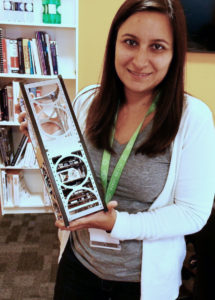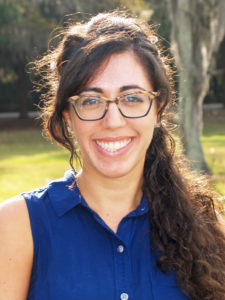Two new scientists have joined the faculty of the University of Georgia Skidaway Institute of Oceanography.
Sara Rivero-Calle is a biological oceanographer whose research focuses on microscopic marine plants known as phytoplankton, and her approach to studying these tiny organisms is cutting-edge.

Rivero-Calle holds a life-size model of a CubeSat satellite.
Rather than collecting samples in research vessels, Rivero-Calle uses miniature satellites to study them from space.
“With satellites, a whole new world opens up,” Rivero-Calle said. “You can look and take global snapshots of what’s happening in the ocean, which you can’t do if you have to go out in a boat and take your samples.”
The miniature satellite Rivero-Calle has been using is named CubeSat and is only slightly larger than a shoe box. She began working with them while working as a post-doctoral fellow at the University of North Carolina-Wilmington.
“I was involved with the first ocean color CubeSat, named ‘SeaHawk’, which is up in orbit right now,” she said. “We’re taking measurements in the visible part of the spectrum, which can tell us about the chlorophyll and the sediment in the water, and it can tell us about the water quality in general.”
Rivero-Calle received her B.S. in biology from the Complutense University of Madrid, Spain, and her M.Sc. in biological oceanography from the University of Puerto Rico. She received her Ph.D. in biological oceanography from Johns Hopkins University.

Natalie Cohen
Natalie Cohen is a molecular ecologist. She started her research by studying diatoms, a type of phytoplankton, but branched out from there.
“I study the molecular components within those tiny cells that live in the ocean,” Cohen said. “So, I study their DNA, their RNA and their proteins.
“And I’m also dabbling and trace metal geochemistry. And that makes Skidaway a really great place to be, because there are several other geochemists here, which is really nice for collaborations and coming up with new research directions.”
Although so tiny they are out of sight to a non-scientist, Cohen says the phytoplankton she studies are a vital part of the ocean.
“They carry out powerful reactions in the ocean, and they’re responsible for the transfer and movement of energy from the surface of the ocean to the ocean interior,” she said. “So, they play an essential role in our ocean biogeochemical cycles.”
Cohen received her B.S. in biology from Penn State and her Ph.D. in marine sciences from the University of North Carolina at Chapel Hill. She joins UGA Skidaway Institute from a post-doctoral fellowship at Woods Hole Oceanographic Institute.
Both Rivero-Calle and Cohen are also assistant professors in the UGA marine sciences department.


